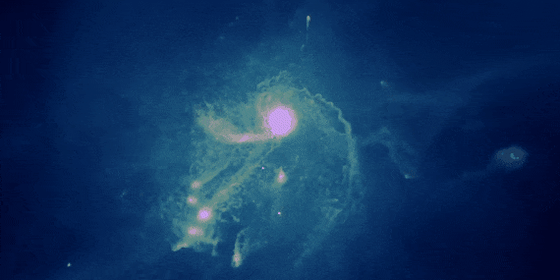Astronomers have long believed that a huge black hole lies at the center of most large galaxies, including our own Milky Way.
Now the results of a large-scale cosmological simulation are in, and they suggest that galaxies like ours commonly host several of these supermassive black holes (SMBHs) — including some that wander unseen far from the galaxies' centers.
"People have been thinking of this idea for a while, but this is the first time it has been predicted with such detail," Dr. Michael Tremmel, a postdoctoral fellow at Yale University's Center for Astronomy and Astrophysics and the leader of the team of scientists who conducted the simulation, told NBC News MACH in an email.
Tremmel said the simulation, which is described in a paper published April 24 in "The Astrophysical Journal Letters," modeled a "small chunk" of the universe: a cube with sides measuring roughly 80 million light-years. Stars, gas, and dark matter were all included in the simulation, as were gravity and other physical processes that govern the growth and behavior of black holes.
The simulation looked at how everything inside this vast cube evolved from the Big Bang some 13.8 billion years ago to the present. Tremmel said it took tens of thousands of computers chugging away for several months to reach its end point.
"Because we have taken care to model the dynamics of these supermassive black holes realistically, we are confident that our prediction is an accurate representation of reality," Tremmel said in a reference to the research team, which included scientists at the University of Washington, University College London, and the Paris Institute of Astrophysics.
The "sibling" supermassive black holes are thought to come about as galaxies bump into one another and coalesce to form a single, larger galaxy. Sometimes the central black hole from one galaxy merges with that of the other to form a single, larger supermassive black hole. But sometimes the black holes remain separate — with the sibling left wandering on the fringes of the newly formed galaxy.
And location isn't the only difference between central supermassive black holes and their footloose kin.
The sibling black holes tend to be smaller than central black holes, Tremmel said. And while central black holes often appear to glow because they're surrounded by glowing disks of superheated gas, sibling black holes — far from the centers of galaxies and the gas that's concentrated there — may lack these so-called "accretion disks" and so may be invisible.
What would happen if one of these huge, unseen black holes came our way? Nothing good.
Prof. Tim Roberts of the Center for Extragalactic Astronomy at Durham University in the U.K. told MACH in an email that a close encounter could cause comets to collide with Earth or perturb the orbits of the planets, possibly tossing some toward the sun and others into interstellar space.
"At worst, the planets and/or the sun might fall into the black hole itself, with the possibility that they would be torn apart by gravitational forces on the way in," he said.
Lucky for us, Roberts said such a scenario is unlikely — as did Tremmel.
"We estimate that a close approach of one of these wanderers that is able to affect our solar system should occur every 100 billion years or so, or nearly 10 times the age of the universe," Tremmel said in a written statement. Or, as he said in the email to MACH, "these SMBHs have most likely had no affect at all on the solar system up to this point and will most likely never have any effect in the future."
Phew!
FOLLOW NBC NEWS MACH ON TWITTER, FACEBOOK, AND INSTAGRAM.


